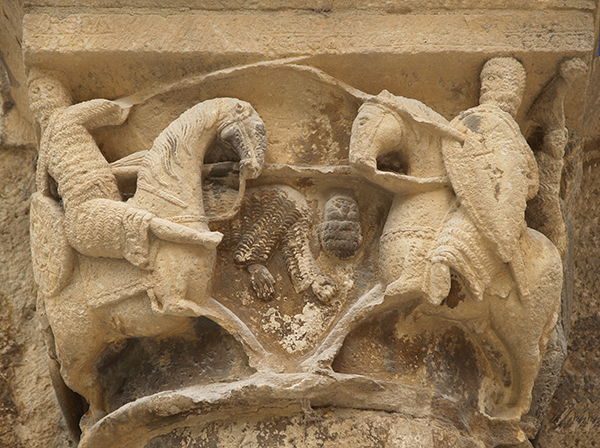The physical absence of the Carolingian army, compounded by the news of their defeat at Errozabal, sparked Widukind's insurrection in Saxony. Charles learned of this uprising only during his retreat to Herstal, when he reached Auxerre. Widukind's revolt was notably violent and led to the destruction of Karlsburg, as documented in the Annales Fuldensis. The Carolingian response was equally harsh, featuring massacres and widespread deportations of Saxons. Following the disaster at the Elbe River and the Battle of Suntelberg, the chronicles register that 4,500 Saxon captives were executed (ad occidendum IIII D) on Charles’ orders in 782, with tens of thousands more deported, a policy repeated in subsequent military campaigns until Widukind’s submission and baptism in 785.
The defeat at Errozabal also had serious economic repercussions for the Carolingian Empire. Unable to rely on war spoils, Charles visited the Abbey of Saint-Denis near Paris on his way back to Herstal to seek financial aid and counsel from Abbot Fulrad. The Chronicon Moissiacense reports that 779 was a year of famine and high mortality among the Franks (in France vero fames magna et mortalitas facta est), which likely exacerbated the financial strain and reinforced Charles' perception of the defeat as divine retribution.

This loss prompted Charles to restructure the kingdom's administration. In March 779, at the Herstal Palace, he enacted several legislative measures through capitularia, which reformed the secular and ecclesiastical administration and the judicial system. The term "capitularia" is derived from the Latin word capitulum, meaning "a heading or chapter," which reflects the structured format of these decrees as collections of individual chapters or articles. Each capitulary was a document divided into articles (capitula), addressing various aspects of governance, law, military organization, ecclesiastical discipline, and everyday life in the empire. These codes, particularly the first three issued in 779, 789, and 794, became the principal legal instruments of the Carolingian kingdom, intended to culturally and socially subjugate and integrate the conquered peoples. These decrees were intended to centralize the vast and culturally diverse territories of the Carolingian Empire.
In Aquitaine, Charles adopted a farther more diplomatic and cautious approach. Likely in the same year as the defeat, but certainly by 781, he avoided imposing harsh capitularia or punitive measures after the meeting at Lippspringe, to prevent further Basque uprisings. Instead, he strategically appointed trusted counts, dukes, and abbots throughout the region. In a significant political move, Charles granted his son Ludovicus, born on Aquitanian soil, the title of Prince of Aquitaine. This act was designed to legitimize Frankish authority over Aquitaine to the Basque people. It is important to remember that during the War of the Eight Years (760-768), Pepin the Short, king of the Franks and father of Charles, wrested Aquitaine from the Vascones (Pippinus rex cumflictum habuit cum Wascones). In 781, the memory of that war was still very much alive among the Basques.
The Basque victory at Errozabal also drew the attention of Muslim forces. In 781, Abd al-Rahman I, the emir of Cordoba, launched a punitive expedition against the Basque leaders involved in the 778 battle. His forces advanced from the south towards Viguera, moving through the route linking Logroño with the Basque heartland around Lizarra, the lands of Ximen the Strong, and into Pamplona, under the rule of Eneko, father of Eneko Aritza, the first king of Pamplona.